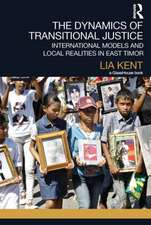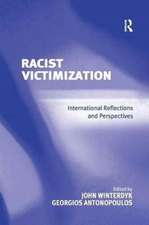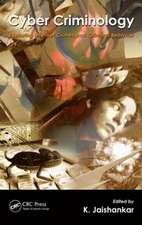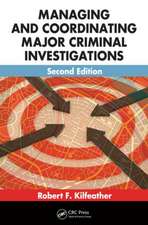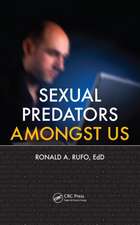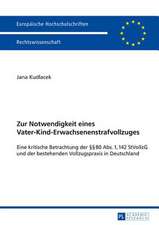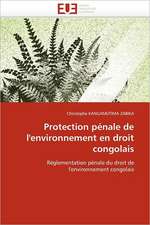Human Trafficking: Exploring the International Nature, Concerns, and Complexities
Editat de John Winterdyk, Benjamin Perrin, Philip Reichelen Limba Engleză Hardback – 5 dec 2011
Topics discussed include:
- How data on human trafficking should be collected and analyzed, and how data collection can be improved through proper contextualization
- The importance of harmonization and consistency in legal definitions and interpretations within and among regions
- The need for increased exchange of information and cooperation between the various actors involved in combating human trafficking, including investigators, law enforcement and criminal justice professionals, and social workers
- Problems with victim identification, as well as erroneous assumptions of the scope of victimization
- Controversy over linking protection measures with cooperation with authorities
| Toate formatele și edițiile | Preț | Express |
|---|---|---|
| Paperback (1) | 266.20 lei 3-5 săpt. | +22.67 lei 4-10 zile |
| Taylor & Francis – 21 ian 2023 | 266.20 lei 3-5 săpt. | +22.67 lei 4-10 zile |
| Hardback (1) | 901.62 lei 6-8 săpt. | |
| Taylor & Francis – 5 dec 2011 | 901.62 lei 6-8 săpt. |
Preț: 901.62 lei
Preț vechi: 1099.54 lei
-18% Nou
Puncte Express: 1352
Preț estimativ în valută:
172.55€ • 179.48$ • 142.45£
172.55€ • 179.48$ • 142.45£
Carte tipărită la comandă
Livrare economică 14-28 aprilie
Preluare comenzi: 021 569.72.76
Specificații
ISBN-13: 9781439820360
ISBN-10: 1439820368
Pagini: 318
Ilustrații: 7 black & white illustrations, 12 black & white tables
Dimensiuni: 178 x 254 x 23 mm
Greutate: 0.75 kg
Ediția:New.
Editura: Taylor & Francis
Colecția Routledge
Locul publicării:Oxford, United Kingdom
ISBN-10: 1439820368
Pagini: 318
Ilustrații: 7 black & white illustrations, 12 black & white tables
Dimensiuni: 178 x 254 x 23 mm
Greutate: 0.75 kg
Ediția:New.
Editura: Taylor & Francis
Colecția Routledge
Locul publicării:Oxford, United Kingdom
Public țintă
PostgraduateCuprins
Introduction. Defining Human Trafficking and Its Nuances in a Cultural Context. Data on Human Trafficking: Challenges and Policy Context. Explaining Human Trafficking. Voices from Victims and Survivors of Human Trafficking. Crime Control versus Social Work Approaches in the Context of the "3P" Paradigm: Prevention, Protection, Prosecution. Human Trafficking and Police Investigations. Prosecution of Trafficking in Human Beings’ Cases. Improving Law Enforcement Identification and Response to Human Trafficking. International Cooperation. Evaluating Responses to Human Trafficking: A Review of International, Regional, and National Counter-Trafficking Mechanisms. Victims of Human Trafficking: Meeting Victims’ Needs? Epilogue. Index.
Recenzii
"A unique effort to combine the contributions of multiple leading experts on human trafficking to address the problem multi-dimensionally: from detection, to support of victims, to prosecution, to prevention. Both the writing and organization is accessible to a wide audience. The contributions of the book lie in its comprehensive approach, its use of well-known experts in the field, a broad focus on all aspects of the problem, and a global approach. In this way, the source, transit, and destination issues unique to human trafficking are addressed systematically and clearly. In addition, the book offers useful regional analyses of the problem which helps the reader to understand variations in the nature, risk, and forms of human trafficking around the world."
— Jay S. Albanese, Ph.D., former Chief, International Centre at the National Institute of Justice; Past President at Academy of Criminal Justice Sciences; and Professor at Virginia Commonwealth University
"This timely edited book by three well established international scholars offers an impressive ensemble of contributions by leading criminologists and criminal justice scholars from around the world. Collectively, they provide a wide array of perspectives on the serious transnational societal problem of trafficking in human beings. The contributions address the spectrum of issues confronting human trafficking today ranging from a discourse as to the meaning of human trafficking, the problems of detecting and recording the problem, to how different elements of society attempt to address human trafficking. As well, there is a contribution on the plight of victims of trafficking and an examination of how best to prevent and/or control the complex phenomenon of modern slavery. This book should be a rich resource for any university level course on the topic as well as serve as an excellent resource for present and future scholars in criminology, criminal justice and security studies. The book should also serve as an advanced reading for practitioners and specialists who deal with prevention and control of trafficking in human beings."
— Gorazd Mesko, PhD, Professor of Criminology at the University of Maribor, Slovenia & Visiting Scholar at the Institute of Criminology at the University of Cambridge, UK
— Jay S. Albanese, Ph.D., former Chief, International Centre at the National Institute of Justice; Past President at Academy of Criminal Justice Sciences; and Professor at Virginia Commonwealth University
"This timely edited book by three well established international scholars offers an impressive ensemble of contributions by leading criminologists and criminal justice scholars from around the world. Collectively, they provide a wide array of perspectives on the serious transnational societal problem of trafficking in human beings. The contributions address the spectrum of issues confronting human trafficking today ranging from a discourse as to the meaning of human trafficking, the problems of detecting and recording the problem, to how different elements of society attempt to address human trafficking. As well, there is a contribution on the plight of victims of trafficking and an examination of how best to prevent and/or control the complex phenomenon of modern slavery. This book should be a rich resource for any university level course on the topic as well as serve as an excellent resource for present and future scholars in criminology, criminal justice and security studies. The book should also serve as an advanced reading for practitioners and specialists who deal with prevention and control of trafficking in human beings."
— Gorazd Mesko, PhD, Professor of Criminology at the University of Maribor, Slovenia & Visiting Scholar at the Institute of Criminology at the University of Cambridge, UK
Notă biografică
John Winterdyk is the director of the Centre for Criminology and Justice Research (CCJR) at Mount Royal University. He is also an adjunct professor at St. Thomas University (Fredericton, New Brunswick, Canada) and the Polytechnic in Namibia (Windhoek, Namibia). He has published extensively in the areas of youth justice, human trafficking, international criminal justice, and criminological theory. John was the recent (2009) guest editor for a special issue of the journal International Criminal Justice Review on genocide. Current areas of research interest include identity theft, corrections, death in custody, prison gangs, teen courts, and crime prevention.
Benjamin Perrin is an assistant professor at the University of British Columbia Faculty of Law. He is the author of several academic articles on human trafficking and Invisible Chains: Canada’s Underground World of Human Trafficking (Perrin 2010a). Professor Perrin has advised the Government of Canada on the human trafficking issue as a senior policy advisor and as a witness before several Parliamentary committees. He has also worked overseas with victims and assisted in the prosecution of child sex offenders. In 2009, Professor Perrin was named a Hero Acting to End Modern-Day Slavery by Secretary Hillary Clinton and the U.S. State Department; he is the first Canadian to receive this honour.
Philip Reichel is a tenured full professor in the Department of Criminal Justice at the University of Northern Colorado and adjunct professor in the Department of Justice Studies at Mount Royal University in Calgary, Alberta, Canada. He has lectured at universities in Austria, Germany, and Poland, participated in a panel for the United Nations University, presented papers at side events during the United Nations Congress on Crime Prevention and Criminal Justice (Brazil) and the United Nations Commission on Crime Prevention and Criminal Justice (Vienna), and was an invited speaker at Zhejiang Police College in Hangzhou, China.
Benjamin Perrin is an assistant professor at the University of British Columbia Faculty of Law. He is the author of several academic articles on human trafficking and Invisible Chains: Canada’s Underground World of Human Trafficking (Perrin 2010a). Professor Perrin has advised the Government of Canada on the human trafficking issue as a senior policy advisor and as a witness before several Parliamentary committees. He has also worked overseas with victims and assisted in the prosecution of child sex offenders. In 2009, Professor Perrin was named a Hero Acting to End Modern-Day Slavery by Secretary Hillary Clinton and the U.S. State Department; he is the first Canadian to receive this honour.
Philip Reichel is a tenured full professor in the Department of Criminal Justice at the University of Northern Colorado and adjunct professor in the Department of Justice Studies at Mount Royal University in Calgary, Alberta, Canada. He has lectured at universities in Austria, Germany, and Poland, participated in a panel for the United Nations University, presented papers at side events during the United Nations Congress on Crime Prevention and Criminal Justice (Brazil) and the United Nations Commission on Crime Prevention and Criminal Justice (Vienna), and was an invited speaker at Zhejiang Police College in Hangzhou, China.
Descriere
Edited by three global experts, this text examines techniques used to protect and support victims of trafficking as well as strategies for prosecution of offenders. The book discusses data collection and analysis, the importance of harmonization and consistency in legal definitions and interpretations within and among regions, and the need for better cooperation between the various actors involved in combating human trafficking. It also explores problems with victim identification, erroneous assumptions about the scope of victimization, and controversy over linking protection measures with cooperation with authorities.

